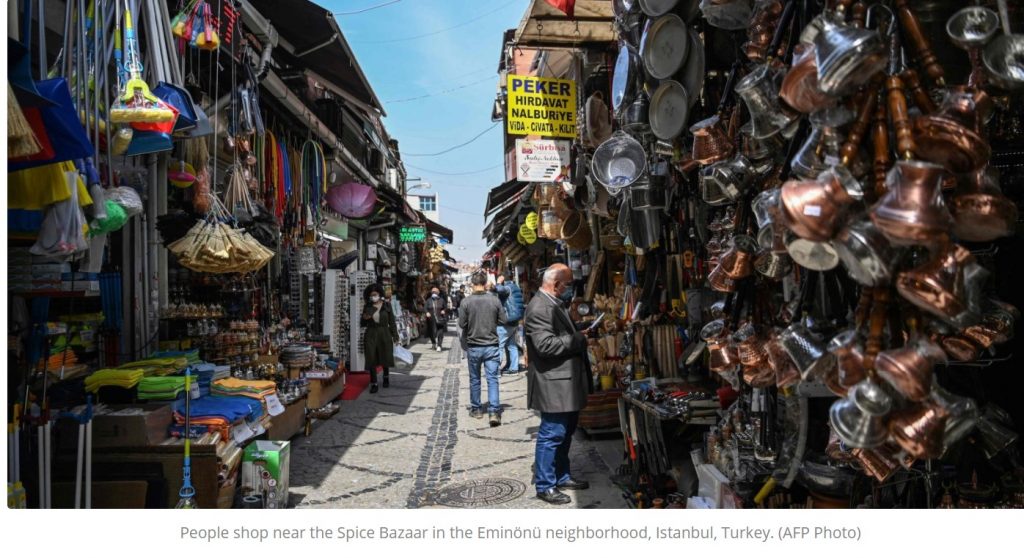Hit hard by the coronavirus pandemic, Turkish shopkeepers have a cause for celebration during the upcoming Islamic holiday of Qurban Bayram, also known as Eid al-Adha.
As with last year’s Eid, authorities did not impose any COVID-19 restrictions because of a decline in the number of cases and an increasing number of vaccinations.
WATCH: Is Turkey safe for tourism?
Business was overshadowed by the curbs brought along by the pandemic over the last 15 months since COVID-19 hit in March last year.
The country already lifted curfews July 1 and most restrictions, except for the mandatory mask rule, ended.
WATCH: A Uniquely Turkish Disease: High Chronic Inflation
Eid had officially begun on Tuesday but Erdogan decreed a nine-day holiday that began last Friday and will end July 26, practice called “bridging” and is common in Turkish politics. The first Eid without curbs has prompted a massive movement in the country as millions hit the road to their hometowns or vacation resorts last week.
Sector representatives say the holiday would inject a fresh shot in the arm for all the industries.
The nine-day holiday is expected to prompt at least a TL 40 billion (nearly $4.7 billion) boost to the economy, according to Confederation of Turkish Tradesmen and Craftsmen (TESK) Chairperson Bendevi Palandöken. To recall Turkey’s GDP is approximately $750 bn.
“July 1 was a milestone for markets. Finally, after 15 months, we breathed a sigh of relief. It is very, very important for all actors of the economy who are going through quite difficult days that there are no restrictions on this holiday,” Palandöken told Turkish language Sabah daily.
“July is the most productive month. There is a big holiday movement in all sectors.”
The massive movement as of Friday has prompted a mobility boom across industries, from accommodation and travel to clothing and food.
Yet, Palandöken called on citizens to show solidarity and shop at smaller tradespeople.
“Our citizens should do holiday shopping with our tradespeople, whose earnings have fallen for almost two years due to the pandemic. It is time for solidarity,” he stressed.
A tradition of people having their hands full while making Eid visits further lifts expectations, Palandöken said, however initial indications from merchants operating in Istanbul’s center for gift shopping, Kapali Carsi (the closed bazaar) is significantly lower footprint and smaller budgets.
“Visits are never made empty-handed according to our traditions. Everyone buys according to their budget. Even this is a situation our tradespeople had been missing out and waiting for about two years,” he noted.
He further emphasized that people suffocated by the pandemic lockdowns would flock to local bazaars, a trend that will bring mobility to many businesses, from restaurants and cafes to stores selling clothing and traditional sweets.
“There is no sector that will not be positively affected by this. Children were not bought clothes on the previous holidays. But we are seeing a significant increase in sales this holiday. It is a positive situation for everyone from cabs to a small candy store.”
While the longest holiday in the world did indeed stimulate tourism, shopping and travel at large, the pay-back was harsh. Social mingling and a flood of unvaccinated Russian tourist helped jack up daily Covid-19 cases from the season-low 5K to 9.5K as of the third day of Id. Public health experts claim that a new wave had already started, which would thwart economic activity and delay the recovery of the labor market.
Follow our English language YouTube videos @ REAL TURKEY: https://www.youtube.com/channel/UCKpFJB4GFiNkhmpVZQ_d9Rg
And content at Twitter: @AtillaEng
Facebook: Real Turkey Channel: https://www.facebook.com/realturkeychannel/
